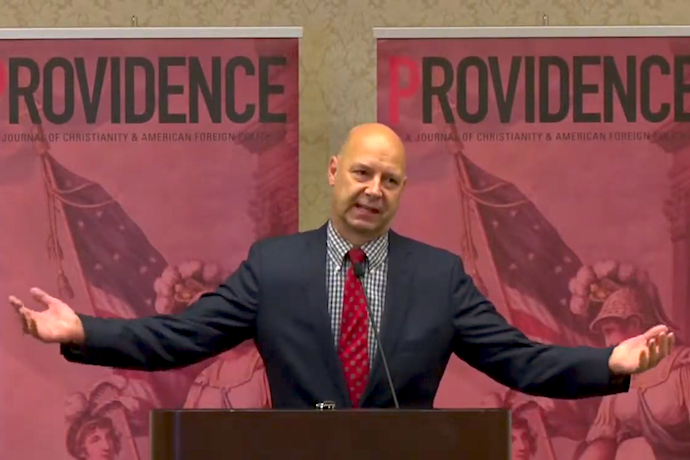
How many local churches are providing direct electoral support to far-right-wing Christian candidates for political…

How many local churches are providing direct electoral support to far-right-wing Christian candidates for political…

Once a trade conference of sorts for the activist fringe, the hard-right Conservative Political Action Conference (CPAC) has enjoyed an increasing amount of influence within the American conservative movement in recent years. The ascendancy of Donald Trump’s MAGA movement in 2015-16 irrevocably shifted the center of gravity of today’s GOP toward a more nakedly extremist, conspiratorial, anti-democratic, and revanchist “populism,” thus placing CPAC firmly within the mainstream of the Republican party.
CPAC itself has been undergoing its own ideological and political realignment, increasingly focusing its energies internationally, reconfiguring the formerly once-a-year conference based in Washington, DC, into a traveling road show.
Over this same period, CPAC itself has been undergoing its own ideological and political realignment, increasingly focusing its energies internationally, reconfiguring the formerly once-a-year conference based in Washington, DC, into a traveling road show. The first international CPAC took place in 2017 in Japan, and others have since taken place in Australia, Brazil, Hungary, and South Korea. Future conferences are also scheduled to take place in Mexico and the Philippines. But this isn’t just about changing the venue of the conference; animating all of this is a growing far-right internationalism that can be seen and heard throughout the program and among the attendees.
This internationalist turn has helped deepen alliances between a coalition of hard-right political parties, activists, and national leaders like Hungarian Prime Minister Viktor Orban, all sharing a certain familial resemblance and a common interest in anti-immigrant, identitarian, and deeply illiberal approaches to governance.
I’ve been able to witness this shift in part, having attended three CPAC events in the United States over the last two years. In 2021, the presence of international speakers on stage was notable, but the feverish conspiracism of the domestically oriented speakers overshadowed the growing internationalist alliance.
Now, in 2022, this hard-right coalition, which some commentators have dubbed the Nationalist International, has only become more conspicuous with the arrival of Orban to the CPAC stage in Dallas, Texas. Orban was perhaps the most warmly received of the speakers in Dallas, aside from fan favorite Donald Trump. “Globalists can go to hell, I have come to Texas,” he bellowed to great applause.
This internationalist turn has helped deepen alliances between a coalition of hard-right political parties, activists, and national leaders like Hungarian Prime Minister Viktor Orban, all sharing a certain familial resemblance and a common interest in anti-immigrant, identitarian, and deeply illiberal approaches to governance.
Ahead of Orban’s speech on Aug. 4, the first day of CPAC Texas, a young man from Oklahoma approached me in the vendor hall and expressed in no uncertain terms that Orban was the man he had come to see. I asked the young man what he thought about the resignation of Orban’s longtime advisor Zsuzsanna Hegedus after Orban gave a speech Hegedus described as a “purely Nazi diatribe worthy of Joseph Goebbels.” He was aware of the incident, but it didn’t seem to impact his interest.
“In Hungary, we introduced a zero-tolerance policy on racism and antisemitism,” Orban said to the crowd, in clear reference to the fallout with his advisor. “So, accusing us is fake news. And those who make these claims are simply idiots.”
Orban went on to say conservatives “should unite our forces” and received huge applause when the speech took a religious turn. He compared Hungary to David, described so-called “globalists” as “woke Goliath,” and made clear his opposition to LGBTQ civil rights.
“Hungary shall protect the institution of marriage as the union of one man and one woman,” Orban said to great applause at CPAC Texas. “To sum up, the mother is a woman, the father is a man, and leave our kids alone.”
After Orban’s speech, while I was chatting with anti-Orban protesters in the lobby, the same young man walked by again and yelled out to me, “great speech, right?”
Later on, a segment titled “The World is Watching” saw representatives from Japan, Hungary, and Mexico speak back to back. One of the speakers, Mexican actor and activist Eduardo Verástegui, had seemingly been confused on the initial agenda listing with Eduardo Bolsonaro, the son of hard-right Brazilian President Jair Bolsonaro, who spoke at CPAC Hungary in May.
“These new socialist governments are all committed to a cultural Marxist agenda,” Verástegui said, referencing the “Cultural Marxism” conspiracy theory that is itself rooted in Nazi propaganda. “Their goal is to destroy the Judeo-Christian civilization of Latin America,” he continued, quickly and casually erasing the history of “Judeo-Christian civilization’s” genocidal obliteration of Indigenous populations that existed there long before.
As a toxic mix of conspiracism, religious fanaticism, and ultranationalism cries out in the United States, the rhetoric that has become the hallmark of this brand of reactionary politics isn’t staying put on American soil. It sings in chorus with similar voices across the world, inspiring and amplifying the rhetoric of hardline politicians like Orban.
Hiroaki “Jay” Aeba, chairman of the Japanese Conservative Union and former political head of Happy Science—a cult that denies the Nanking Massacre ever occurred—implored the audience to take to the Metaverse to protect their free speech rights. And Miklos Szantho, managing director of the Hungarian government-funded Center for Fundamental Rights, pushed an openly internationalist line after speaking forebodingly about the ostensible threats to Western civilization.
“It is crucial for us to work together internationally to make the Liberals’ nightmare,” Szantho said, “through the international cooperation of conservative national forces.”
Taken together, these speeches illustrate the uncanny synchrony of the language used by members of the Nationalist International, as well as the ability of American conservative politics to set the tone (and provide a template) for far-right movements around the world—and for the international alliances they’re forming. As a toxic mix of conspiracism, religious fanaticism, and ultranationalism cries out in the United States, the rhetoric that has become the hallmark of this brand of reactionary politics isn’t staying put on American soil. It sings in chorus with similar voices across the world, inspiring and amplifying the rhetoric of hardline politicians like Orban.
But the Nationalist International isn’t a club exclusively for the power elite, and it wouldn’t exist without a movement of followers. A group called the European American Community advertised a reception with activists on the second day of CPAC Texas. The group describes its Facebook page as “a safe place for fellow America First Patriots to discuss ethnic nationalism, identitarianism, and the future of our Historic Anglo American Nation and European Race.”
Meanwhile, on the CPAC exhibition floor inside the Hilton Anatole, a nonprofit group called Republicans for National Renewal manned a branded booth and networked with fellow die-hard activists. The group describes its aim as “promoting national-populism within the Republican Party.” In May, they hosted a summit around the CPAC Hungary event titled “The Future of Western Renewal: A Transatlantic Patriot Summit.”
“This gathering, along with the CPAC Hungary event, demonstrates the interconnectedness of American and European far-right thinking, and highlights the xenophobic, nationalistic rhetoric that is being promoted—and applauded—on both sides of the Atlantic,” the Anti-Defamation League reported in June.
As Thorleiffson writes, ultranationalism, and the “ultra-nation” can be understood as nationalism that takes on a quasi-religious, if not outright religious, character. Something right at home at CPAC Texas, where Texas Lt. Gov. Dan Patrick asserted that the constitution was literally written by God before leading the crowd in prayer.
The phrasing around “Western Renewal” may seem innocuous, perhaps even positive, to the uninitiated. But the veiled language of “Western Renewal” is steeped in a history of far-right, often antisemitic, politics, and it is used today as a dogwhistle by groups hellbent on stemming “undesirable” immigration and rejecting the very concept of multiculturalism for a return to more “traditional” and racially, ethnically, culturally homogenous societies. In particular, the language of “Western Renewal” is popular in extreme spaces like 4Chan. As extremism researcher Cathrine Thorleifsson wrote in November 2021, “on [the 4Chan forum] /pol/, it is evident that the fascist new order and the regeneration of the ultra-nation are conceived in transnational terms of European or Western renewal as a whole, thus promoting violent action globally.”
As Thorleiffson writes, ultranationalism, and the “ultra-nation” can be understood as nationalism that takes on a quasi-religious, if not outright religious, character. Something right at home at CPAC Texas, where Texas Lt. Gov. Dan Patrick asserted that the constitution was literally written by God before leading the crowd in prayer. Per Thorleiffson, the relationship between fascism and the idea of the “ultra-nation” can be situated through the conceptualization of fascism proposed by British historian and political theorist Roger Griffin, which frames fascism as an ideology characterized by populist ultranationalism that contains mythical ideas of national revival, often hearkening to a lost, racially coded past.
Members of the Republicans for National Renewal have ties to white supremacists and other extremists. As reported by The Daily Beast in November 2021, the grassroots director of Republicans for National Renewal formerly hosted a neo-Nazi themed podcast called “Blood, Soil, and Liberty” with a member of a now-defunct white supremacist group, Identity Evropa. This event was not an outlier. The same ADL article from June describes Republicans for National Renewal’s numerous connections to a variety of extremists, some of whom speak in openly antisemitic terms.
Among those extremists with links to Republicans for National Renewal is Jack Posobiec. Posboeic, a far-right, conspiracy-theory-peddling media personality whose ties to neo-Nazis and other extremists have been extensively documented by the Southern Poverty Law Center, had a prime speaking spot at CPAC Texas. He used the opportunity to promote what he calls the “New Right,” a clear attempt to rebrand the hateful “alt-right” term that has declined in use in recent years.
If CPAC Texas is any indicator, there isn’t much new about the “New Right”—except, perhaps, its growing internationalism. But Orban speaking at CPAC Texas is less of a beginning for this international right-wing movement than a culmination, not unlike how a mushroom cap is just the most visible part of a deeper mycological network. The authors of the book The International Alt-Right: Fascism for the 21st Century? trace the transnational quality of the alt-right across Europe, as well as in countries as diverse as Japan, India, and Russia. Through an examination of the history of the alt-right and its various ideological strains, they draw out the distinctly nativist quality of the movement, which often manifests as a politics of white supremacy, and they elucidate the modern tactics the movement uses to spread its ideas, such as “meme warfare.”
As the authors of The International Alt-Right define it, the Alt-Right’s core belief is that “‘white identity’ is under attack from pro-multicultural and liberal elites and so-called ‘social justice warriors’ (SJWs) who allegedly use ‘political correctness’ to undermine Western civilization and the rights of white males.”
And indeed, if you were sitting in the audience at CPAC Texas, that’s not far from the sort of narrative you would have heard.
“A new Marxism has infiltrated all parts of our lives as a master thief,” said Szantho. “It wears many cloaks, depending on what seems most effective. It appears as BLM, the cult of radical race theory, or gender ideology, and what was once known as progressive. Better called by its name, Marxism.”
Even if its headline American representative is no longer in office, the emboldened Nationalist International and international alt-right should concern American antifascists. Autocratic leaders like Orban have more ability to play the long game, and their commitment to hardline nationalist agendas hasn’t faded during the Biden presidency in the slightest. Trump won millions of votes in 2020, and the brand of ultranationalism he helped foster in this and other countries is here to stay for the foreseeable future.
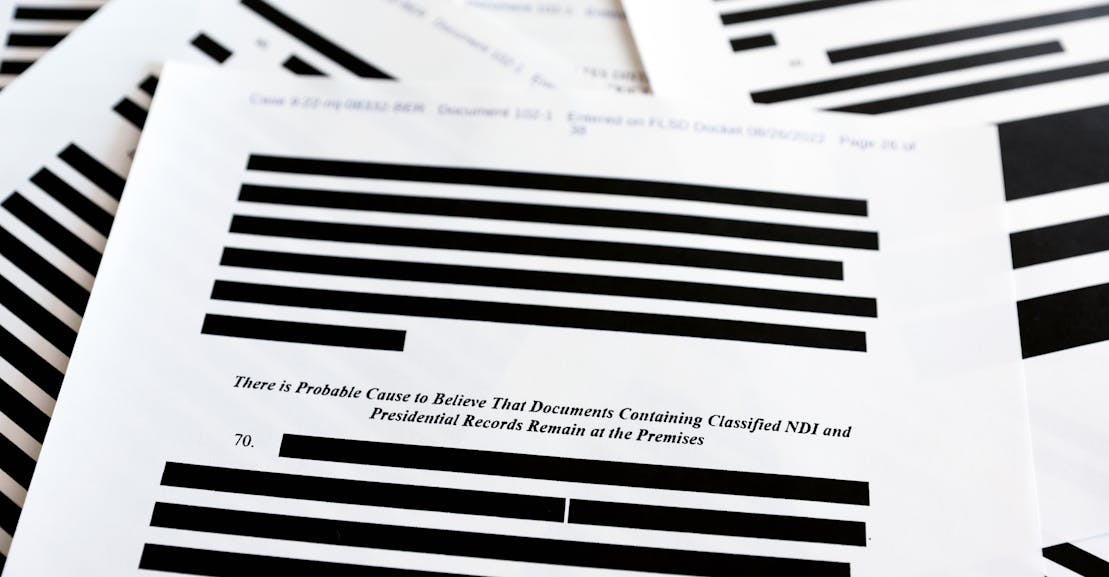
Over the weekend, a south Florida federal judge—appointed by Donald Trump and approved by the Senate a few days after the 2020 election with 21 Democrats voting against her—announced her “preliminary intent” to grant Trump’s wish for a special master to review the Mar-a-Lago classified documents. This move may allow his legal team to slow-walk this disaster for a little bit. A court will have to go through the material to determine if anything is covered by Trump’s claims of executive privilege. This seems hard to imagine given that executive privilege has never before applied to an ex-president, but we’ll have to see.
Whatever happens on that front, Trump knows the truth. D-Day is coming. Merrick Garland, Christopher Wray, and a widening circle of other people know exactly what’s in those top-secret documents he has, and Trump knows they know. And there’s reason now to think that some of it is pretty explosive. That’s on top of the mere fact that it’s apparently illegal for him to possess them in the first place.
This brings us to an interesting, and terrifying, new reality. Trump has lived his entire life flouting the law, wriggling out of trouble because he’s rich and powerful and could hire good lawyers. But this time’s different. Now he’s cornered. Thus the terrifying question: What is a cornered Donald Trump capable of?
I decided to ask someone who knows him a lot better than I do. I emailed that question to Michael Cohen this past Saturday, and he emailed back this: “There is nothing Donald Trump won’t do to save himself from accountability. Starting a civil war, threatening to trade government secrets to our adversaries, or throwing others under the bus to deflect from his culpability are just a few of the options circling inside Donald’s head. The country needs to be very concerned!”
OK, well, that’s a lot! Let’s examine these scenarios one by one.
Starting a civil war: I don’t take Cohen to mean that Trump would literally make a call to arms. Rather, it’s that he would incite such rage against the Justice Department, the FBI, and the entire system so methodically closing in on him that he would winkingly (or maybe not even) encourage violence.
Trump’s allies are already making such calls and have been for a while. Steve Bannon has told his listeners that “this is war” and has referred to the FBI as “the Gestapo.” Members of Congress have tweeted about the need to “defund” the FBI (Marjorie Taylor Greene) and called for a “complete dismantling and elimination of the democrat brown shirts known as the FBI” (Paul Gosar). That is civil war–level rhetoric. And at least one Ohio man took this rhetoric seriously enough to attack an FBI field office in Cincinnati, which led to his death. (Mona Charen of The Bulwark has gathered several examples of this kind of incendiary commentary here.) Trump, if indicted, will throw gallons of his own gasoline on that toxic and treasonous fire.
I used to ask myself: When will this Trump movement become unambiguously fascist, such that no one can even bother debating it or denying it any longer? The answer I settled on is: When he raises a private army or militia of his own that sometimes works alongside local police and federal law enforcement officials and at other times battles them but that answers only to Trump and operates under rules of engagement that only Trump enforces.
That, after all, is what Hitler’s brownshirts did. They were an explicitly Nazi Party militia. We saw that in an ad hoc way on January 6, 2021. That was a fascist militia that stormed the Capitol. It just wasn’t a standing one. If Trump is indicted, it is alas no longer far-fetched to imagine that some kind of standing militia—organized not even around one political party but around one man—will conjure itself into being and carry out acts of violence against certain individuals or institutions.
Trading government secrets to our adversaries: This scenario has me really worried. The form I can see this most readily taking is blackmail of Garland and the entire U.S. government. That is: If you indict me, Trump may communicate privately to Garland, I’m turning everything I have over to the Kremlin. I know that sounds utterly insane. But who can doubt he’d do it in a heartbeat if he thought it was his best play? Trump has, in fact, already sent a cryptic “Nice democracy you got here, it’d be a shame if anything happened to it” kind of message to Garland. And let me remind you of Cohen’s first sentence: “There is nothing Donald Trump won’t do to save himself from accountability.”
Throwing others under the bus. Of all the scenarios, this is the one that might be entertaining, as opposed to some grave threat to democracy. Trump might have dirt on some of his allies that he’ll release publicly to save his own skin or to humiliate them if they should turn on him. But while it might look like a hilarious spectacle for a while—a series finale on the long-running reality show in which Trump’s inner circle has been trapped—this too would still eventually precipitate and extend a long national nightmare that would have Trump as its central figure.
Cable news talking heads are saying, after the release last week of the FBI’s redacted affidavit, that an indictment of Trump is now less a matter of if than of when. As New Republic contributor Alex Thomas noted, that “when” could be a while off—investigations involving classified material tend to be long and drawn out. But if an indictment is a fait accompli, then we’re in for something we’ve never seen in this country; something perhaps never seen in any country or certainly in any democracy: a former head of state potentially leading a civil war and/or committing open treason by using state secrets for leverage.
Remember the pattern of Trump’s life. He has spent 50 years doing whatever he wanted to do, giving no thought to the law or consequences of his actions. And he has never faced any serious consequences. Through endless trials and four bankruptcies and all the rest, the only thing that has happened in his life is that he’s gotten more powerful and richer (certainly since being president, the way he’s cashed in on occupying the White House for four years), with millions of Americans quite literally ready to kill or die for him. He’s truly been bulletproof.
Until, perhaps, now. He may finally have crossed a line that will force the system he has so long ignored and abused to stop him and try to bring him to justice. What do we get when we combine a completely conscienceless human being with the power and latitude given by our Constitution and body of laws to presidents and a propaganda apparatus that constantly lies for him? We’re about to find out.
H
ungarian Prime Minister Viktor Orbán has become a hero for the American right. This past January, Tucker Carlson relocated his Fox News show for the second time to Budapest. In May, Orbán himself opened a special event in Budapest organized by the U.S. Conservative Political Action Conference; the Hungarian leader was a guest again at the group’s annual meeting this month in Texas, where his declaration that “the globalists can all go to hell” was greeted with hosannas.
In between those two appearances, Orbán was welcomed for a huddle with Donald Trump. And after the prime minister gave a speech in July in Romania warning about the perils of “mixed race” relationships, the well-known American conservative writer Rod Dreher rose to his defense, brushing aside any notion that Orbán is racist and overlooking Hungary’s fascist past. John O’Sullivan, a former editor of National Review, now runs a think tank called the Danube Institute, which receives funding from the Hungarian government, which is run by Orbán’s populist national-conservative party, Fidesz. In the Claremont Review of Books, Christopher Caldwell declared that Orbán is “blessed with almost every political gift—brave, shrewd with his enemies and trustworthy with his friends, detail-oriented, hilarious.”
The right’s ardor for Orbán has prompted some performative confusion in Western media. An Economist headline asked, “Why Is the American Right Obsessed With Viktor Orbán?” And an article in The Hill by Kim Lane Scheppele, a sociology professor at Princeton, was titled: “Orbán Dazzles US Conservatives—What Do They See in Him?”
[Read: Freedom fights for survival in Hungary]
The most common answer is that Orbán has made Hungary a laboratory for the conversion of a liberal democracy into an authoritarian state. The thinking goes like this: For an American right fascinated (in an obviously self-interested manner) by the creation and maintenance of minority rule, the formula begins with a crackdown on the press. Snub international institutions (in Orbán’s case, the European Union) and depict the Holocaust survivor George Soros as a diabolical financier. Add in an assault on the rule of law. Finish off any lingering political opposition by gerrymandering it out of existence. The end result is a white, Christian nation that can safely hold back the malignant forces of globalist tyranny. Case closed.
Or is it?
Despite the U.S. right’s recent Hungarian romance, the truth is that its endorsement of foreign authoritarianism is rooted in a long-standing hostility toward American democracy, one that predates Orbán’s rise to prominence. The American right’s weakness for authoritarianism has drawn less attention than the American left’s periodic attraction to dictatorship; consider the long and melancholy history of American leftist excuse-making for Stalin and Mao.
All along, a similar, if less noticed, malady was taking root on the right. Over the past century, a number of conservative intellectuals and journalists have hailed a succession of authoritarian regimes. The real seduction was power itself: In a memorable 1946 critique of James Burnham, a former Trotskyist who later helped William F. Buckley Jr. found National Review, George Orwell identified the underlying desire to “usher in a hierarchical society where the intellectual can at last get his hands on the whip.”
The modern right’s antipathy toward liberal democracy can be traced back to the early 20th century, when a Boston Brahmin named Brooks Adams famously complained about “the degradation of the democratic dogma.” Henry Adams adopted his brother’s phrase, borrowed from Edmund Burke, for the title of his 1920 book, and suggested that the corruption of American democracy from the Washington to the Grant administrations contradicted Darwin’s theory of evolution.
This conservative unease about American democracy reached its apogee with H. L. Mencken, a passionate Nietzschean, an anti-Semite, and an admirer of Kaiser Wilhelm. Mencken’s fervor for Kaiser Bill, as he was known in America, may seem a mere idiosyncrasy in retrospect, but his enthusiasm exhibited many of the traits that would characterize succeeding conservative generations, above all a disgust for supposed cultural decadence allied to an exalted view of foreign authoritarian values that should be adopted in—or, if necessary, forced upon—America. Prussia, in other words, could set right what was wrong with America. And so, when World War I erupted, in 1914, Mencken was ecstatic:
I, too, like the leaders of Germany, had grave doubts about democracy … It suddenly dawned on me, somewhat to my surprise, that the whole body of doctrine that I had been preaching was fundamentally anti-Anglo Saxon, and that if I had any spiritual home at all it must be in the land of my ancestors. When World War I actually started I began forthwith to whoop for the Kaiser, and I kept up that whooping so long as there was any free speech left.
Indeed he did. All that was missing was for him to don a spiked helmet. Mencken wrote two articles—for The Atlantic, in fact—about the conflict, lauding Germany’s “grave, blond warriors” in one, in 1914, and Germany’s military leadership in the other, in 1917. Another essay Mencken submitted, in 1915, “After Germany’s Conquest of the United States,” never ran; shortly after the magazine received it, a German U-boat sank the Lusitania en route from New York to Liverpool; more than 100 American citizens were among the nearly 1,200 lost. (“Your reprehensible paper is damnably effective,” The Atlantic’s editor, Ellery Sedgwick, wrote the author, but “I have no desire to foment treason.”)
The pattern Mencken established never ended. In the 1920s and ’30s, the American right moved toward isolationism and, citing a pacifist disdain for war, sympathized with the Third Reich. Charles Lindbergh, Henry Ford, and Joseph P. Kennedy urged solicitude for Hitler’s grievances. Crediting the Nazi leader with having “determined the broad lines of our national life for at least another generation,” The Wall Street Journal urged “realism” in June 1940, even as Germany was overrunning France. And the young Buckley imbibed this credo in the first magazine he ever subscribed to: Scribner’s Commentator, a pro-isolationist monthly that revered the Lone Eagle (Lindbergh) and denounced “warmongers” pushing for aid to an embattled Great Britain. (The publication went out of business in 1942, after its assistant editor, Ralph Townsend, was arrested by the FBI for acting as a Japanese agent; he subsequently pleaded guilty.)
[Adam Serwer: Conservatives are defending a sanitized version of ‘the Great Replacement’]
During the Cold War, the American right assailed liberals who had supported the battle against fascism as soft on communism. As Arthur Schlesinger Jr. noted in 1952, also in The Atlantic, the right’s eagerness to expose supposed domestic traitors served mainly as cover for its own, earlier failure to stand up to Nazism. Nevertheless, the style was set. Buckley’s National Review went on to praise a long list of thuggish regimes.
One of Buckley’s early National Review colleagues, Willmoore Kendall, was an eccentric intellectual who had lived in Spain during the Civil War and who had switched his allegiance from Leon Trotsky to Francisco Franco. In a short story based on Kendall’s life, “Mosby’s Memoirs,” Saul Bellow writes of his protagonist that he had “made some of the most interesting mistakes a man could make in the twentieth century.” One such mistake was Kendall’s decision to serve as an adviser to Rafael Trujillo, who ruled the Dominican Republic from 1930 until his assassination in 1961. In a 1957 letter to the political theorist Leo Strauss, Kendall explained how Trujillo—widely regarded as one of the bloodiest dictators in Latin American history—exemplified “Hobbes’ ‘public-spirited philosophy.’”
At Yale, Kendall had taught both Buckley and L. Brent Bozell Jr., who later became Buckley’s brother-in-law, and Kendall’s influence on them endured. As the historian Joshua Tait has observed, Buckley’s magazine was a fount of propaganda for fascist Spain: “The conservative experience of Spain was characterized by celebrations of the Nationalist victory against leftist ‘aggression,’ anti-anti-Franco apologia, and rethinking conservative dogmas in the shade of Spanish cathedrals.” In 1957, Buckley visited Spain and declared Franco a “genuine national hero.” For his part, Bozell lived in Spain during the 1960s and ended up a fanatical Catholic monarchist.
When it came to apartheid South Africa, prominent conservatives offered a farrago of excuses to defend official segregation, just as they had defended Jim Crow in the American South. In a 1960 editorial, National Review declared outright that apartheid was a force for good: “The whites are entitled, we believe, to pre-eminence in South Africa.” Buckley himself implied in 1963, after traveling through South Africa, that the critics of apartheid were the intolerant ones: “We should try at least to understand what it is they are trying to do, and deny ourselves that unearned smugness that the bigot shows.” A founding father of the conservative movement, Russell Kirk, who lamented the Warren Court’s support for voting rights, recalled Burke’s phrase to warn in a 1965 article for National Review that a universal franchise would be a disaster in South Africa because “this degradation of the democratic dogma, if applied, would bring anarchy and the collapse of civilization.”
[Read: The conservatives dreading—and preparing for—civil war]
The right went on to compound these errors with puff pieces about the Chilean dictator Augusto Pinochet as an economic modernizer or the Angolan rebel Jonas Savimbi as a freedom fighter. In our time, some have fastened upon Russian President Vladimir Putin as a heroic defender of traditional Christianity and a foe of global elites. The praise for Putin was ignited in 2013 by the pundit and former presidential candidate Pat Buchanan, who claimed that the Russian dictator seemed to be an authentic paleoconservative, one whose mission was “to redefine the ‘Us vs. Them’ world conflict of the future as one in which conservatives, traditionalists, and nationalists of all continents and countries stand up against the cultural and ideological imperialism of what he sees as a decadent west.”
Then came the invasion of Crimea in 2014, which prompted a number of conservatives to depict Putin as a virile leader, in contrast to President Barack Obama. “People are looking at Putin as one who wrestles bears and drills for oil,” Sarah Palin said. “They look at our president as one who wears mom jeans and equivocates and bloviates.” Similarly, Rudy Giuliani said of Putin, “That’s what you call a leader.” In 2017, Caldwell, of the Claremont Review of Books, wrote: “If we were to use traditional measures for understanding leaders, which involve the defense of borders and national flourishing, Putin would count as the pre-eminent statesman of our time. On the world stage, who can vie with him?”
Now that Putin is mired in a calamitous war in Ukraine, American conservative fealty to him has begun to taper off. But the impulse to celebrate a foreign authoritarian leader as an enticing model has not. Today, this branch of conservatism continues to prophesy a new national ideal that scorns liberal democracy. Although the left’s former fascination with communist countries such as Cuba or Vietnam has faded, the right’s affinity for antidemocratic regimes has not. Far from being unique, Orbánism is simply its latest iteration.
Where the Leninist left once hoped to accelerate history, the right’s political pilgrims aim to reverse it—restoring an idealized past of ethnic homogeneity, traditionalist ideas of family and religion, and pre-democratic social hierarchy. These conservatives are entranced by Orbán’s bombast about defending a “Christian nation” against a Muslim invasion from the Middle East and elsewhere.
“Lacking any understanding of the languages, histories, or actual beliefs of the citizens of authoritarian regimes, conservatives—like the leftists who admired the Soviet Union—see what they want to see,” Geoffrey Kabaservice, the author of Rule and Ruin, a history of the modern Republican Party, told me, “and choose not to think about the monstrosities that would accompany the imposition of that model on the United States.”
This is the guiding spirit of a new movement on the political right, the self-described national conservatives who first emerged in 2019 and enjoy funding from moguls such as Peter Thiel. Among other things, the “NatCons,” as they are known, seek to detach nationalism from fascism, a task that one of the group’s champions, Yoram Hazony, undertook in his specious book The Virtue of Nationalism. At a NatCon conference in Rome in 2020, Christopher DeMuth, the former president of the American Enterprise Institute, conducted a public interview with Orbán himself, introducing the Hungarian strongman as “boldly at the forefront. He is not only a political but an intellectual leader.” A NatCon 3 conference in Miami is scheduled for September, where Florida Governor Ron DeSantis—who is casting himself as an American Orbán with his culture-war crusade against woke liberals, LGBTQ topics in local schools, and freedom of speech at colleges and universities—will be among the main speakers.
America’s new national conservatives are looking to fulfill an old dream—of taking strength from an autocrat abroad to rule without restraint at home. As Orwell understood, when they see someone wielding the whip, they want to get their hands on it.

Adolf Hitler inspects a formation of the Hitler Youth in Nazi Germany, ca. 1927–45. (CORBIS / Getty Images)
One of the most tiresome arguments leveled against socialism claims that Nazism was somehow “socialist,” and so something the Left needs to answer for. Adolf Hitler’s men marshaled the economy for war, put the state above the individual — and, as the killer argument, they even called themselves “National Socialists.”
Checkmate? Not quite. Even aside from the fact that other conservative and liberal parties actually voted for full powers to Hitler in 1933, his regime was characterized by massive interventions to help out private business. And the social Darwinism championed by the Nazis, counting the “unproductive” as mere wasteful expense, obeyed the logic of judging human life by the yardstick of profit.
In 2009, Israeli historian Ishay Landa published the book The Apprentice’s Sorcerer: Liberal Tradition and Fascism, an extensive study of the economic and social interests the Nazis really pursued. In this interview with Jacobin, he explains what the term “socialism” meant to Hitler, how his political and economic views were connected — and why we can see the dangers of economic liberalism in Elon Musk today.
In your book, you examine the economic policies and the ideology of the National Socialists in Germany. Were the Nazis policies actually socialist?
No, obviously they weren’t socialist. It’s true that the Nazis occasionally used the term affirmatively. Some people cynically latch onto that as evidence: “They were socialists because they called themselves socialists!” But they were strongly anti-socialist in any real sense of the term.
Then why did they use the word “socialism” at all?
We have to understand the context in which they applied the term. In our own days, right-wing politicians no longer use the term. Why? Because socialism is no longer so popular. But back then, anti-communists faced the challenge of gaining access to socialist strongholds and convincing as many working-class voters as possible. So, they had to present their policies as agreeing with the interests of the working class. The trick was to benefit from the popularity of socialism, which was widely seen as the force of the future, but at the same time to distance themselves as much as possible from its substance.
If the Nazis called themselves socialists only for strategic reasons, what did their economic policies actually look like?
They were strongly capitalist. The Nazis placed great emphasis on private property and free competition. It’s true that they intervened in the free market, but it was also a time of a systemic failure of capitalism on a global scale. Almost all states intervened in the market at the time, and they did so to save the capitalist system from itself. This has nothing to do with socialist sentiment: it was pro-capitalist. In a way, there’s a parallel there with the way big banks were bailed out by governments after the 2008 financial crisis broke out. That, of course, did not reflect socialist intentions in any way, either. It was merely an attempt to stabilize the system a little bit.
The Nazis placed great emphasis on private property and free competition.
But don’t capitalists always want as much freedom as possible?
Not necessarily. State interventions at that time took place in agreement with industry. The capitalists even demanded it, because free-market policies are not always in the best interest of capitalists. They sometimes need the state to succor the free market. So, interventions were not simply imposed on the economy by the fascists — it was a consensual development reflecting requirements by many important sections of industry. The goal was essentially to steer the system in favor of big business.
How is the political ideology of the Nazis related to this attempt to stabilize the system?
Hitler is often accused of subordinating economic interests to his political views, a claim that is partially true. But what exactly were his political views? If we think about Hitler’s most fanatical obsessions – for example, social Darwinism, eugenics, or even his antisemitism — at first blush it appears as though these can only be understood in isolation from economic considerations. However, if we look more closely at each of these elements, we see that they had an indispensable economic basis.
For example?
Social Darwinism is actually a form of hypercapitalism. It takes from capitalism the focus on competition as a struggle of all against all. And the Nazis argued: “Well, that’s just the way nature is.” This was not a break with capitalism, but an intensification of economic views. Capitalism, in the Nazis’ view, is simply a part of nature. So, it is not just a matter of political domination, but of naturalizing economic contradictions. Hitler then said that it is above all “the Jew” who is trying to play a little trick on nature in order to make the struggle for survival superfluous. The will to tamper with the economy made Jews insidious, from the Nazi point of view.
But isn’t this very positive view of free competition and the struggle of all against all precisely the hallmark of economic liberalism?
Hitler didn’t invent all of this, of course; it was part of the conservative and indeed economically liberal mainstream. One could hear very similar statements about the need for ruthless competition in the liberal economic discourse of the time. That someone like Hitler could become the “leader” of a major industrial nation was, after all, the culmination of certain widely held views about economics and about the due limits of popular, political agency. Hitler’s policies met the wishes of many industrialists — which made him so attractive to large sections of the bourgeoisie and the educated classes. The National Socialists were seen as liberating the economy from unnecessary burdens of political and humanistic sensitivity.
Through eugenics, for example?
Exactly. The murder of people with physical, mental, and psychological disabilities was also directly linked to economic concerns — it was intended to rid the economy of people who were considered a burden. The Nazi language was quite economic and financially minded in this respect. For example, a typical propaganda poster read: “60,000 Reichsmarks throughout his life: that is the cost of this hereditary sick person for the Volksgemeinschaft [the Nazi word for national community]. Volksgenosse [national comrade], that is also your money.”
Even the Shoah is related to economic considerations. For in Nazi ideology, Jews were seen as the ultimate obstacle. Obstacle to what? To capitalism, not least. They were considered the backbone of Marxism. The Nazis construed Marxism as an essentially Jewish conspiracy against the capitalist economy — and thus against the natural order. Of course, the Shoah was the result of many factors and the culmination of various Nazi obsessions, phobias, and hatreds. But among all these, one shouldn’t lose sight of this socioeconomic factor.
But why were the Nazis able to call Marxism a great evil that must be eradicated, while they used socialism as a positive slogan for their movement?
By the term “socialism” they didn’t mean anything that we would even remotely recognize as socialist, but rather their policy of intervening in the free market for the benefit of the capitalists. By the term “Marxism,” on the other hand, they meant social democracy and the protection of basic workers’ rights. In Mein Kampf, Hitler says that his antisemitic world view was finally formed the moment he realized that the Jews were the masterminds of social democracy. Nazi discourse was a very convenient — if cynical — way of manipulating concepts and ascribing them completely new meanings.
By the term ‘socialism’ they didn’t mean anything that we would even remotely recognize as socialist, but rather their policy of intervening in the free market for the benefit of the capitalists.
If this is so clear, why have there been these recent debates in Germany about a supposedly socialist policy of the Nazis?
Well, this is actually not so new, and has a long history. Already during the time of fascism there were attempts to portray the Nazis as socialists, for example by Ludwig von Mises. But in general, the efforts to establish a direct link between Marxism and National Socialism was a minority position. Then, beginning in the 1980s, a turning point occurred when a revisionist current began to emerge in fascism studies. It sought to link fascism much more strongly with the political left, with revolution and with anti-capitalism. This happened at a time when neoliberalism was beginning to dismantle the welfare state. Which made this ideological move very convenient. Advocates of this policy could say: “The Nazis actually stood for an authoritarian form of socialism!” Attacking the welfare state could thus be presented as an anti-fascist act, a resistance to Nazism and a purging of its political residues.
So, turning Nazis into socialists is also a tool to push through anti-worker policies?
That’s right. When did intellectuals actually start writing books accusing the Nazis of having pursued socialist economic policies? When did they start accusing the Nazis of having assisted the masses at the expense of the bourgeoisie? Exactly at the time that politicians tried to impose neoliberal reforms on the labor market. In this way, historiography is linked to economic realities. Policymakers used these theories to support their attacks on the welfare state. Götz Aly, the German historian, said in one of his interviews at the turn of the millennium that it was the task of the Social Democratic government under Gerhard Schröder to finally put an end to the “Volksgemeinschaft.” Thus, by liberalizing the economy, the last vestiges of National Socialism would be removed from German politics. This thinking shows how current political fashions are linked to the ways we perceive the past.
But did liberals ever confront the fact that Hitler was in part advancing their own political program?
There was never a truly forthright and direct reckoning with this legacy. In the postwar years, there was a consensus that the state had to moderately improve the situation of workers — even within a liberal framework. If there was a liberal admission of guilt, it was made on the premise that Nazi policies had not been true liberalism. Nazi liberalism — so argued the few scholars that admitted any relationship between the two ideologies — had been half-baked, helplessly old-fashioned, and renounced the democratic dimension inherent to liberalism.
Later, however, there was a radical change. Suddenly, liberals were much more inclined to say: “National Socialism was socialist. And if you fight against socialism to create a market that is as free as possible from any political interference, you’re a good anti-fascist.” That was the much more enduring, anti-“populist” phase of liberal engagement with the past.
Another way to enforce economically liberal reforms is by linking social and economic liberalization. Do you think that economic liberalism always goes hand in hand with social progress?
I think we should make a distinction between the economic and the political dimensions of liberalism. At the beginning, they sometimes went hand in hand. But at a certain stage, the economic and the political aspect drifted apart. Liberals then had to decide where their priorities lay. Are they economic liberals who defend private property, class society, and the free market at all costs, or do they prefer liberal democracy to actually deliver on its promise of freedom and self-determination for all people? This contradiction has not yet been resolved. And the need to make a choice between the two options abides.
Why can’t you do both?
The conventional wisdom is that liberalism always goes hand in hand with political and individual freedoms, which is sometimes true. But what is forgotten is that from the very beginning liberalism not only opened up political possibilities, but also severely restricted them. What liberalism had to make clear from the beginning was that private property is untouchable; that it forms the unassailable basis of the political order.
What liberalism had to make clear from the beginning was that private property is untouchable; that it forms the unassailable basis of the political order.
So, important liberal thinkers insisted as early as John Locke, you can’t tax the rich without their consent. If you do so, you give the victims of these policies a good reason to rebel and use violence against the usurpers. Liberal politics thus had a dictatorial option inscribed in it from the very beginning. And so it became a dogma to assume that the main task of politics is to protect property, and its principal sin to inveigh against it. But of course, that is a very narrow definition of what politics can or should do. And we suffer from that confinement to this day. In a typical Western democracy, you can do many things — as long as you refrain from infringing on private property.
So there is something in the basic structure of economic liberalism that actually impedes people’s freedom?
Capitalism is essentially an antidemocratic economic structure: it means, above all, domination over workers. Capitalism is hierarchical, not egalitarian. There is also a massive concentration of wealth, which raises a crucial question: How can we redistribute it? Classical liberalism says: “Don’t do anything to change the situation.” But that strictly limits the political sphere, and enormously reduces its possibilities. If we keep the economy secluded from political deliberation, democracy is seriously hamstrung. So, the liberal economic view is to say to the masses, “Don’t try to be too logical when you think about democracy! Don’t try to take democracy at its word. It only creates a lot of trouble!”
And don’t try to improve the economic situation for anyone but the bourgeoisie.
Exactly. And that remains the case very much today. Elon Musk’s statements provide a treasure trove of examples for what we’re discussing here, because he’s pretty frank and blatant about it. He recently said that Americans are trying to shirk hard work and that they should take a cue from Chinese workers “burning the midnight oil.” That’s a very clear statement because, of course, he knows that Chinese workers have no way to democratically resist hard working demands. He implies that the democratic system is far too lax and indulgent and we need a much stricter system to discipline workers, to make them work hard and accept low wages — a system like we see in China.
Musk has also recently announced that he will support the Republicans. This is despite the fact that Donald Trump still plays a central role in the party.
That’s a fine indication of the dictatorial option built into liberal thinking. I’m by no means saying that all liberals would support anything like that. But it’s very hard to reconcile economic and political liberalism. As a result of this conundrum, some political liberals choose a different path economically, and others vacillate back and forth between the two poles without ever really being able to resolve the fundamental conflict. To some extent, it could be argued that socialism is itself a child of political liberalism. Marx and Engels started out as political liberals and never abandoned the basic ideas of liberalism: freedom and democratic participation for all. They merely developed their concept further because they recognized that under capitalism the prospects for the realization of a genuine democratic project were seriously limited.

The early morning crew at Fox News lashed out at President Joe Biden Friday morning, just hours after he held a fiery rally in Maryland Thursday night and made the stakes for the November midterms clear: It’s democracy or fascism.
“What we’re seeing now is the beginning or the death knell of an extreme MAGA philosophy. It’s not just Trump, it’s the entire philosophy that underpins the — I’m going to say something, it’s like semi-fascism,” President Biden, aware he was entering dangerous territory, declared as he steamrolled ahead.
“America must choose. You must choose — whether our country will move forward or backward,” Biden told the audience at the fundraising event that looked more like a Trump rally, packed to the gills with thousands of screaming fans of the president. “Trump and the extreme MAGA Republicans have made their choice — to go backwards full of anger, violence, hate and division.”
READ MORE: Biden White House Smacks Down Marjorie Taylor Greene in a Tweet
“The MAGA Republicans don’t just threaten our personal rights and economic security,” Biden said. “They’re a threat to our very democracy. They refuse to accept the will of the people. They embrace political violence. They don’t believe in democracy.”
“I want to be crystal-clear about what’s on the ballot this year,” Biden said. “Your right to choose is on the ballot this year. The Social Security you paid for from the time you had a job is on the ballot. The safety of our kids from gun violence is on the ballot.”
“MAGA Republicans don’t have a clue about the power of women. Let me tell you something: They are about to find out.”
“I respect conservative Republicans,” Biden added. “I don’t respect these MAGA Republicans.”
It was President Biden labeling Trump’s “Make America Great Again” philosophy “semi-fascism” and how he defined “MAGA Republicans” that infuriated the Fox News “Fox & Friends First” hosts.
“President Biden just trashed 70 million Trump supporters again!” one Fox News host screamed. “Boy that seems very familiar, a little like Hillary’s ‘deplorables’ comment, doesn’t it?”
In fact, it seems nothing like former U.S. Secretary of State Hillary Clinton’s 2016 remarks, which were almost never fully reported, although Buzzfeed’s Ruby Cramer captured them and NPR published the transcript in full, which is below.
READ MORE: Watch: Megyn Kelly Unleashes Profane ‘F’ Word Attack on Dr. Fauci
It’s important to note how Clinton expressed great compassion for GOP voters, and called on all Americans “to understand and empathize” with them:
“You know, to just be grossly generalistic, you could put half of Trump’s supporters into what I call the basket of deplorables. Right? The racist, sexist, homophobic, xenophobic, Islamophobic — you name it. And unfortunately there are people like that. And he has lifted them up. He has given voice to their websites that used to only have 11,000 people, now have 11 million. He tweets and retweets offensive, hateful, mean-spirited rhetoric. Now some of those folks, they are irredeemable, but thankfully they are not America,” Clinton said barely months before the 2016 election.
“But the other basket, the other basket, and I know because I see friends from all over America here. I see friends from Florida and Georgia and South Carolina and Texas, as well as you know New York and California. But that other basket of people who are people who feel that government has let them down, nobody cares about them, nobody worries about what happens to their lives and their futures, and they are just desperate for change. It doesn’t really even matter where it comes from. They don’t buy everything he says but he seems to hold out some hope that their lives will be different. They won’t wake up and see their jobs disappear, lose a kid to heroin, feel like they’re in a dead-end. Those are people we have to understand and empathize with as well.”
Watch Fox News’ Friday morning response to President Biden’s remarks below or at this link:
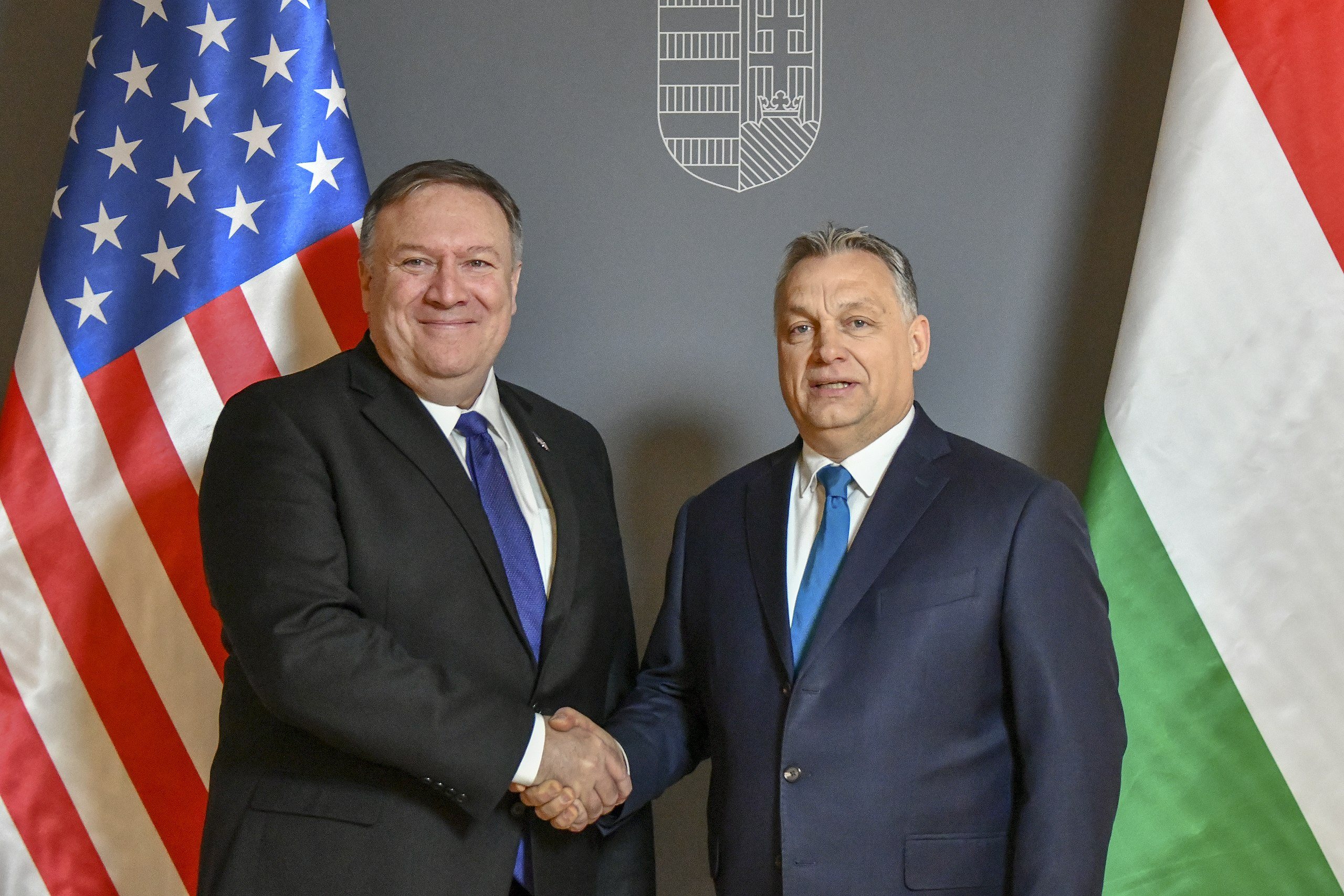
Orbán has declared war on liberal democracy and in doing so appeals not only to anti-communists, right-wing Christians, nativists, and homophobes, he also provides a model of Christian nationalism for those conservatives in the United States such as Donald Trump, Tucker Carlson, and Ron DeSantis who want to hollow out liberal democracy from the inside. More
The post The Scourge of Fascist Politics and the Rise of White Nationalism from Orbán to DeSantis appeared first on CounterPunch.org.

A year and half after the attempted physical coup that marked the end of Donald Trump’s presidency, I am still lectured by certain older white and male “leftists” on how it is childish wolf-crying to say that a fascist menace stalks the United States. The lectures hold that “the American ruling class is opposed to fascism and will not let it take hold here. This is neoliberal capitalism,” their argument runs, “and the ruling class will not permit a fascist state here in the absence of a revolutionary socialist proletariat like the ones that convinced the Italian and German bourgeoisies to line up behind Mussolini and Hitler in interwar 20th Century Europe.” In short, It Can’t Happen Here, because the ruling class doesn’t need and want it and won’t allow it. More
The post Only Fools Count on Capital to Stop Late Fascism appeared first on CounterPunch.org.
For more than four decades, the Council for National Policy, or CNP, has functioned as the secret hub of the radical right, coordinating the activities of right-wing strategists, donors, media platforms, and activists. Its membership and meetings have long been undisclosed, but over the past two years, a number of them have been brought to light. It has spawned generations of offshoots, which appear, disappear, alter URLs, and change names with astonishing frequency. Now two watchdog organizations have obtained new materials on the group’s current operations.
The Center for Media and Democracy has published the agenda for a recent CNP meeting, held February 22 to 24 at the Ritz-Carlton in Laguna Niguel, California. In addition, Documented, an investigative watchdog and journalism project based in Washington, D.C., has obtained the membership roster and most recent 990 tax filings required of nonprofit organizations. Together, the materials shed new light on the CNP’s role in disrupting the democratic process. CNP archives illustrate the extensive planning its members undertook to discredit the 2020 election results, undermine local election officials, and incite the protest on January 6, 2021. The House select committee on January 6 has subpoenaed CNP election expert Cleta Mitchell, and the panel is also examining 29 texts exchanged between then–White House chief of staff Mark Meadows and Supreme Court spouse Ginni Thomas (a board member of the CNP’s lobbying arm) in support of Donald Trump’s attempts to overturn the election. The Conservative Partnership Institute, which has attracted ample attention for its role in election subversion, is closely tied to the CNP, though few reporters have made the connection. The CPI’s chairman, president and CEO, senior legal partner, and senior director of policy are all prominent members of the CNP (see below), and the CPI has served as a public face for CNP tactics developed behind closed doors.
Until now, the most recent CNP membership roster that was publicly available was dated October 2020. One can observe significant turnover from meeting to meeting, while various core donors and leaders remain constant. Reading the tea leaves, this shift suggests several possibilities. First, the rosters may indicate only the attendees of a particular meeting, while the broader membership might be much larger. Second, the new names on the February 2022 agenda may represent new approaches for the organization’s strategy. Below, I draw attention to some of the more striking developments in CNP’s leadership and membership, in the agenda, and in CNP’s funding.
The biggest development in the CNP membership is the addition of two dozen medical professionals. Two of the physicians, Simone Gold and James Todaro, have been active in the America’s Frontline Doctors campaign, orchestrated by the CNP and the 2020 Trump campaign, to downplay the Covid-19 crisis, discourage vaccinations, and peddle the bogus “cures” of hydroxychloroquine and ivermectin. Gold and her associates operated a lucrative online prescription service as she awaited sentencing for her illegal incursion into the Capitol during the January 6 riot. Another addition of note is Seymour H. Fein, M.D., who heads CNF Pharma, a pharmaceutical firm based in New City, New York.
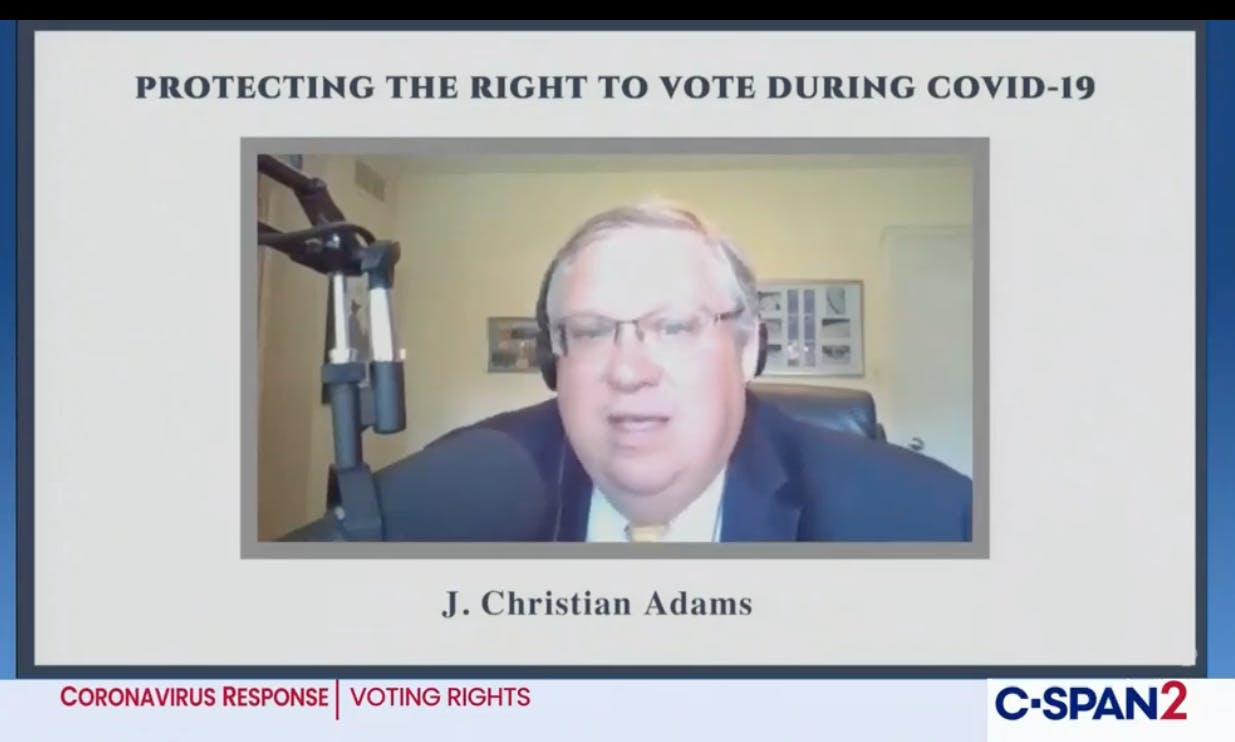 CSPAN/YOUTUBE
CSPAN/YOUTUBE
J. Christian Adams (new), president, Public Interest Legal Foundation
Adams is an associate of Cleta Mitchell, the CNP attorney who guided efforts to subvert the 2020 election, at the Public Interest Legal Foundation: Adams is president and general counsel, Mitchell is chair, and John Eastman, who drafted Trump’s failed plan to block congressional certification of the 2020 election, is a director. In late 2021, Adams, Trump’s appointee to the Civil Rights Commission, successfully nominated Mitchell to the Advisory Board of the Election Advisory Commission, despite widespread protest.
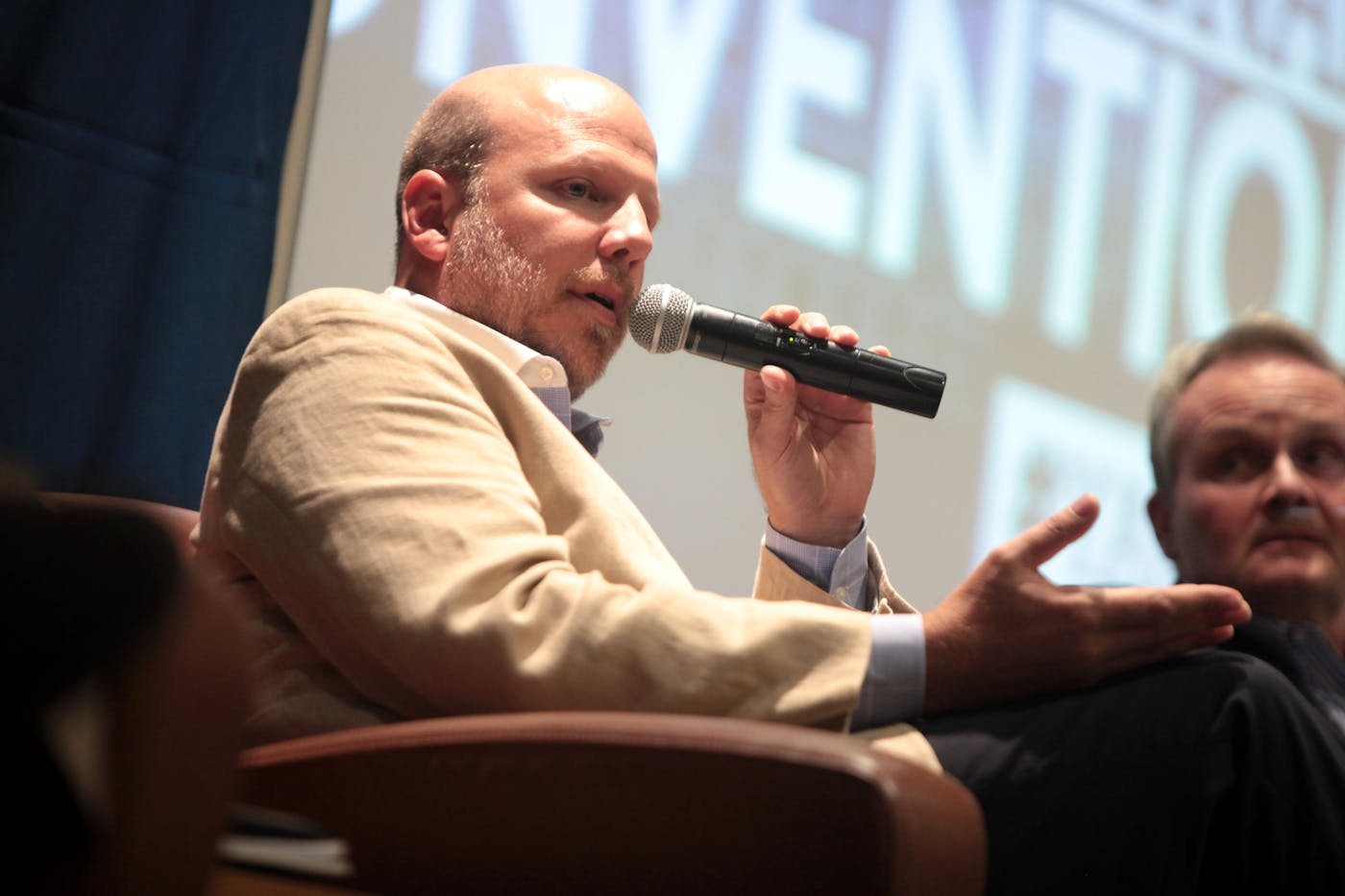 Gage Skidmore:CC bu SA 2.0
Gage Skidmore:CC bu SA 2.0
Lawson Bader, president, DonorsTrust and Donors Capital Fund
DonorsTrust and Donors Capital Fund are linked dark money, donor-advised funds. DonorsTrust had revenues of nearly $202,800,000 in 2018. Donors Capital Fund’s revenues peaked in 2016, at over $71 million. Major donors include the Koch brothers and CNP affiliates the Bradley Foundation and the DeVos family. Recipients include the National Rifle Association, the Federalist Society, the Heritage Foundation, and ALEC—all run by members of the CNP.
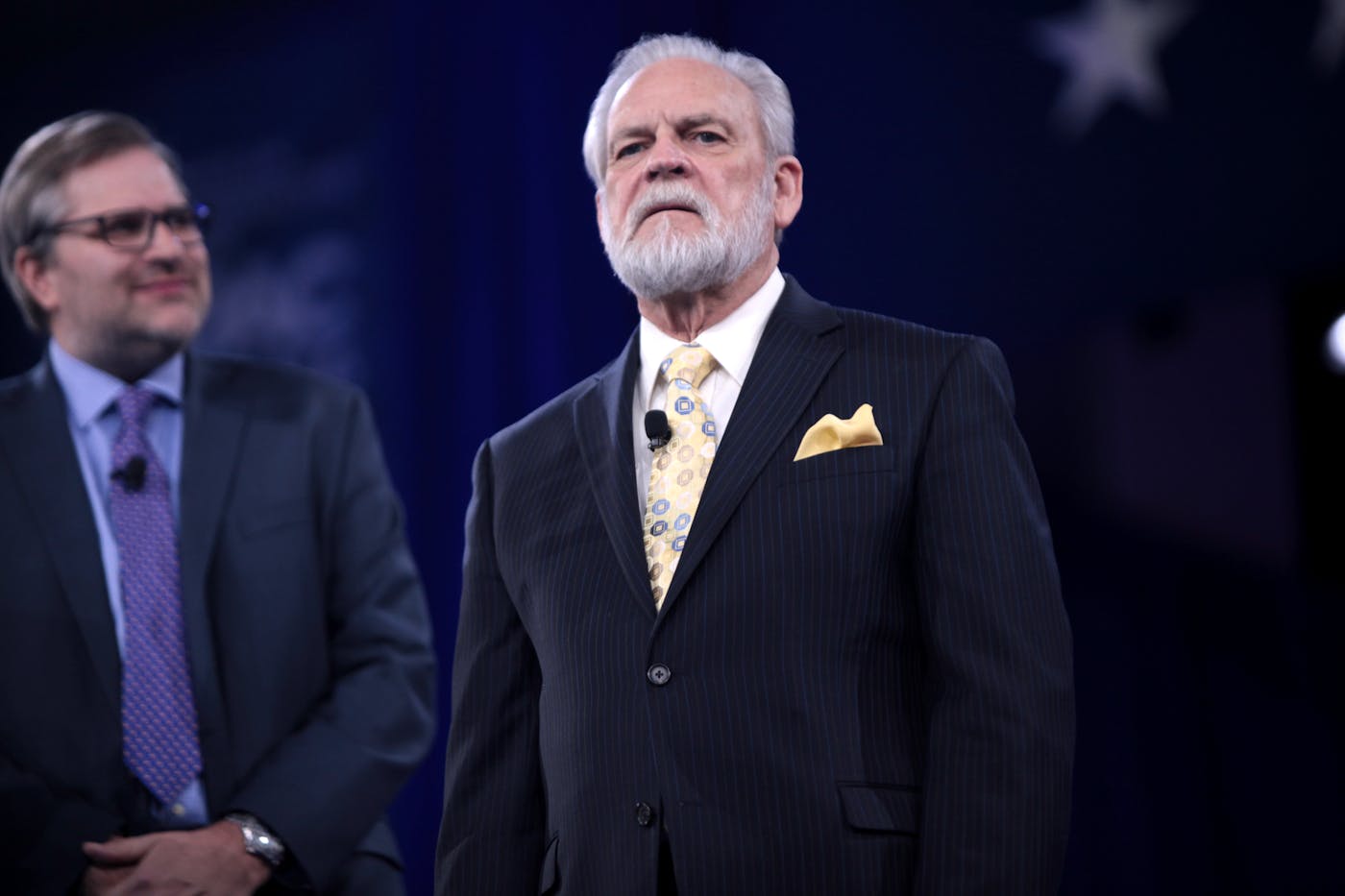 Gage Skidmore:CC bu SA 2.0
Gage Skidmore:CC bu SA 2.0
Larry T. Beasley, CEO, The Washington Times
In 2015, Beasley was appointed to the board of directors of the American Conservative Union by chairman Matt Schlapp, later a leading election denier.
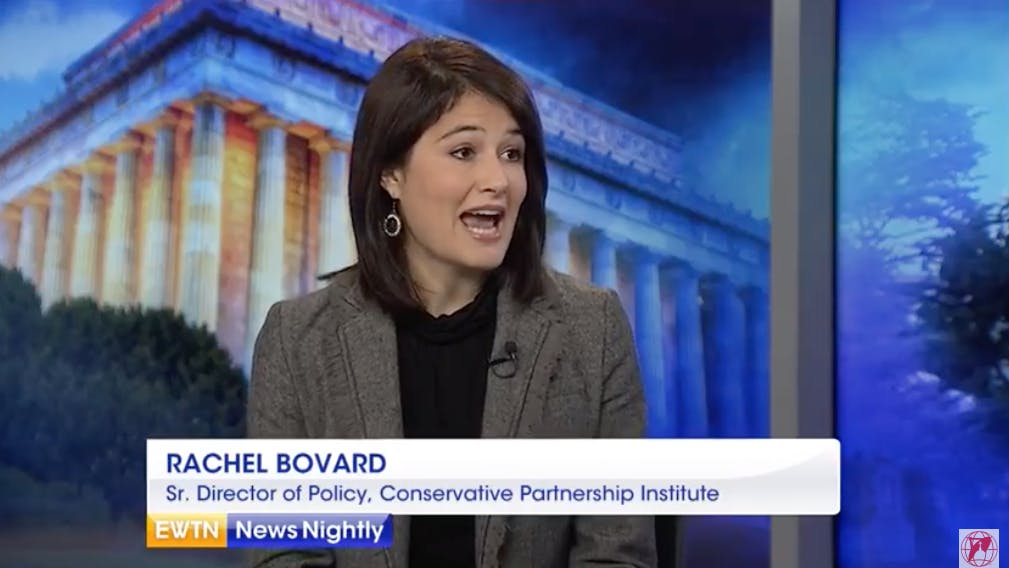 EWTN News Nightly/YouTube
EWTN News Nightly/YouTube
Rachel A. Bovard, senior director of policy, Conservative Partnership Institute
The Conservative Partnership Institute has held statewide voter-suppression summits in key battleground states through its Election Integrity Network, chaired by Cleta Mitchell. The CPI is chaired by former U.S. senator and longtime CNP member Jim DeMint. Its president and CEO is CNP member Ed Corrigan, and its senior legal fellow is the CNP’s Cleta Mitchell. In January 2021, DeMint hired Trump’s former White House chief of staff Mark Meadows, and in July—a week after the House voted to establish the January 6 commission—Trump’s Save America PAC contributed $1 million to the organization.
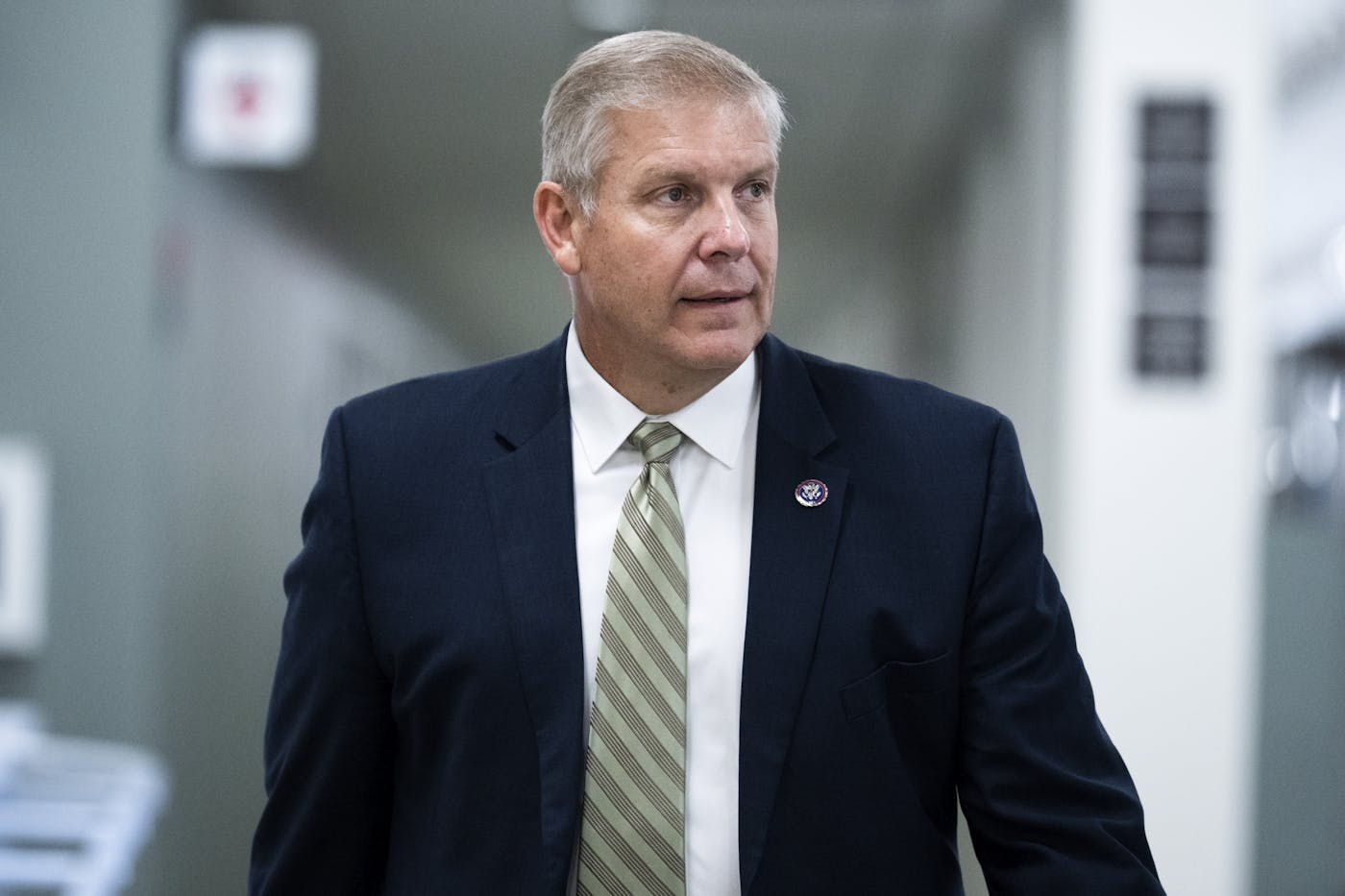 Tom Williams/Getty Images
Tom Williams/Getty Images
Georgia Representative Barry Loudermilk
In 2019, Loudermilk compared Trump’s first impeachment to Christ’s crucifixion. A dogged election denier, Loudermilk has admitted to leading a tour of the Capitol on January 5, 2021.
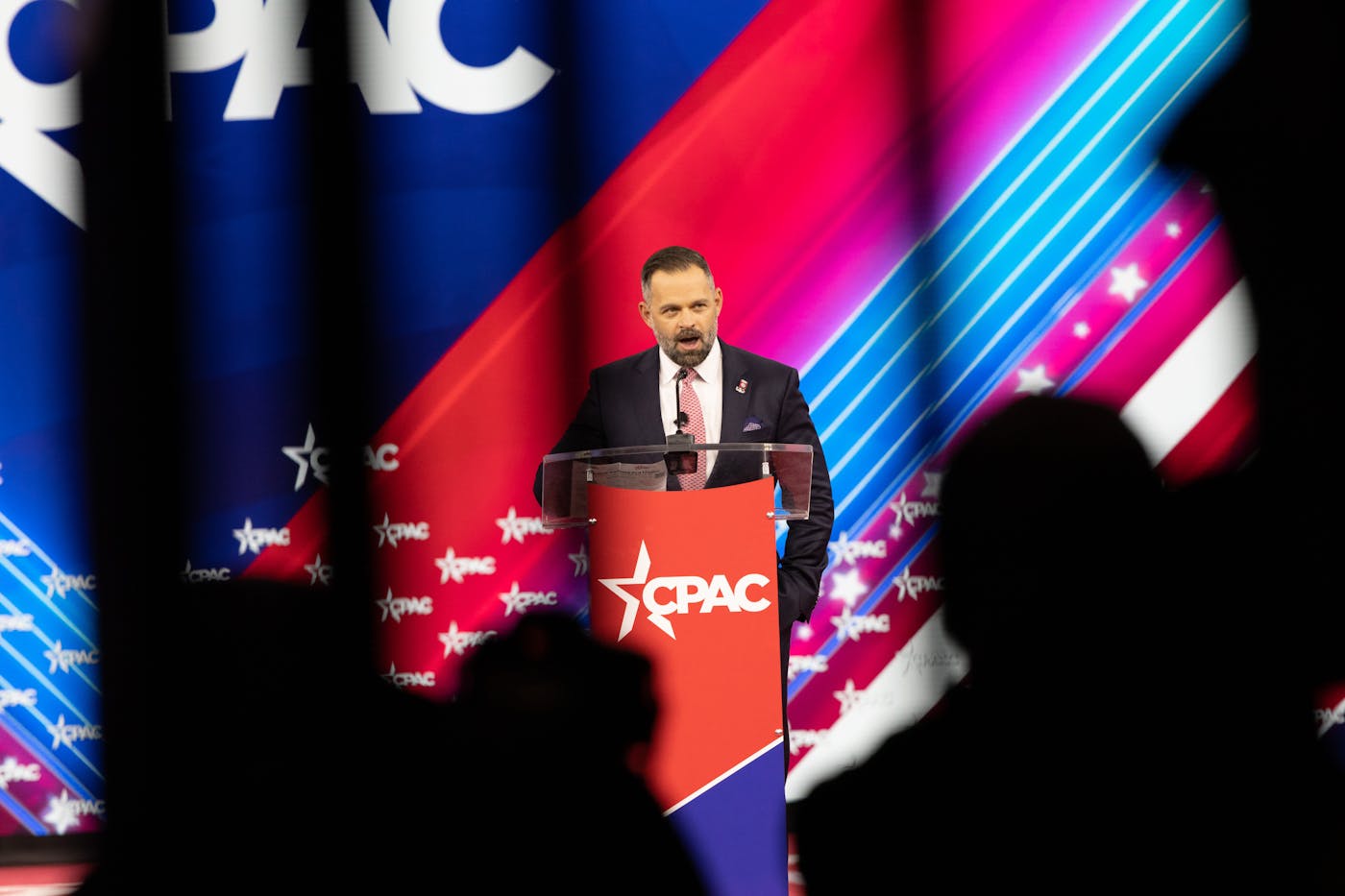 Tristan Wheelock/Bloomberg/Getty Images
Tristan Wheelock/Bloomberg/Getty Images
Cory Mills, Republican nominee for Congress, Florida, 7th district (Orlando)
Mills, a veteran of the 82nd Airborne Division, has released an online ad based on PACEM Solutions, a company he founded and chairs, which produces “riot control munitions for law enforcement.” His ad, for which he has scheduled a “six-figure” television buy in Orlando, shows video footage of police using tear gas against “Hillary Clinton protesters,” “Black Lives Matter protesters,” and others. On August 23, Mills won the GOP primary, and according to Politico he is favored in the November general election due to a “controversial new congressional map championed by Gov. Ron DeSantis.” Politico predicts that the new map could raise the Republican margin in the state from 16-11 to 20-8 in the next Congress.
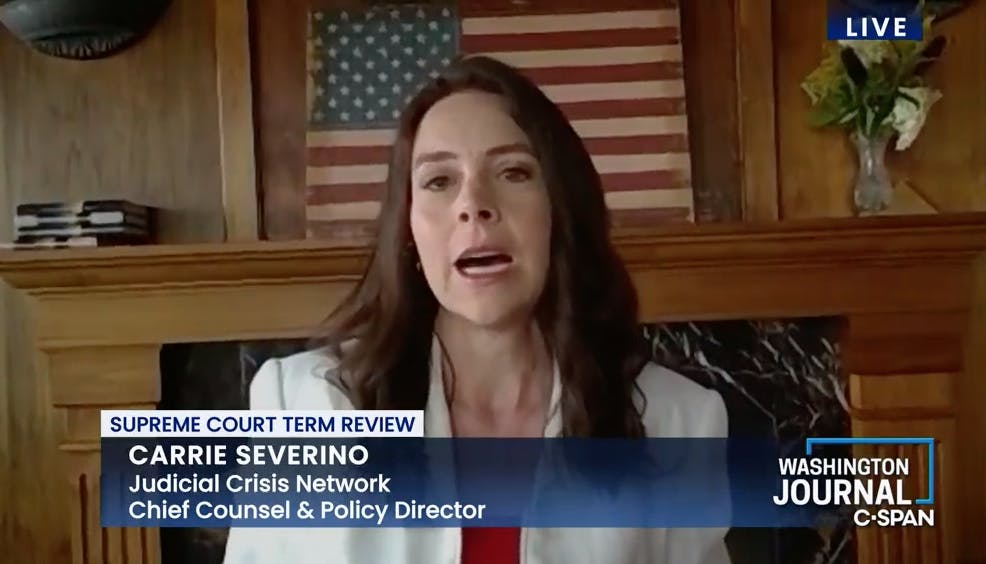 C-SPAN/YOUTUBE
C-SPAN/YOUTUBE
Carrie Campbell Severino, president, Judicial Crisis Network
Severino has long been featured as a legal expert on CNP-linked media, such as Tony Perkins’s Washington Watch broadcast. A former clerk for Clarence Thomas, Severino convened a “war room” of Catholic and CNP organizations after the death of Ruth Bader Ginsburg to defend Trump’s ability to appoint a justice in advance of the November election.
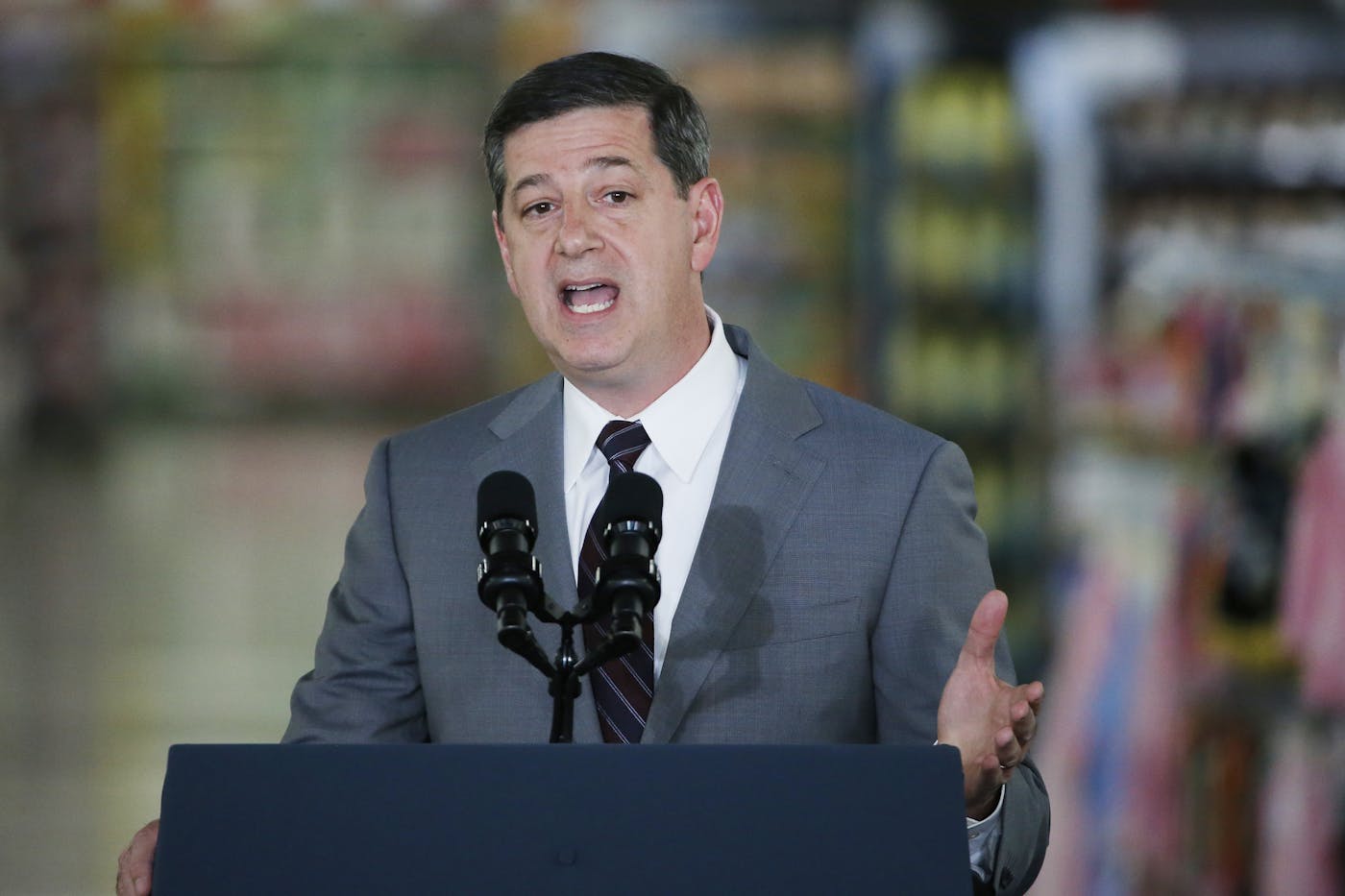 Stephen Lam/Getty Images
Stephen Lam/Getty Images
William S. Simon, retired CEO and president, Walmart U.S. (2010–2014)
Simon stepped down as CEO of Walmart’s domestic operations following a period of slow sales. He currently serves as a senior adviser for the investment firm KKR.
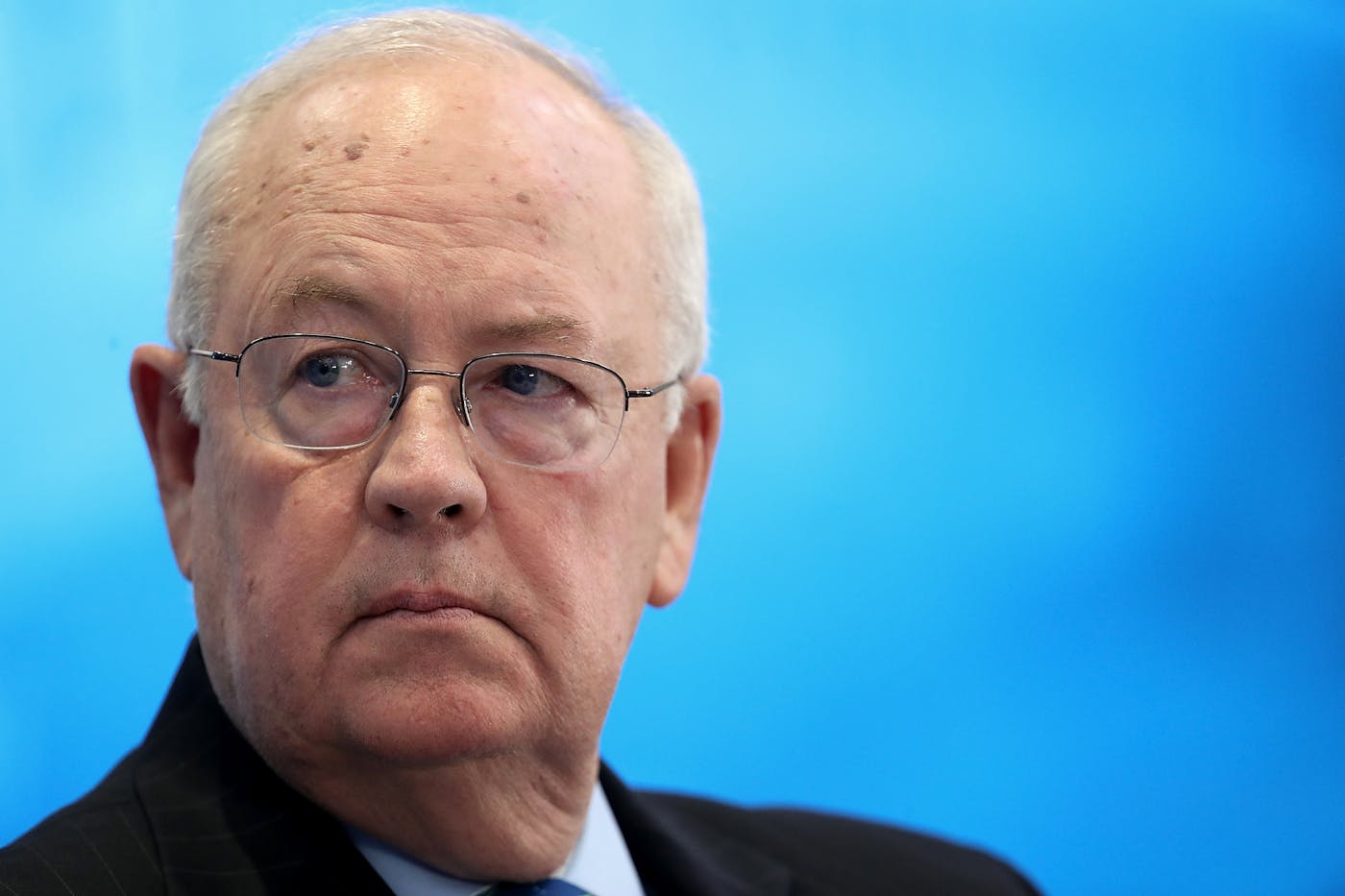 Win McNamee/Getty Images
Win McNamee/Getty Images
Kenneth Starr
Starr is best remembered for heading the Whitewater investigation of members of the Clinton administration. As a member of the CNP, Starr joins Donna Rice, who generated a scandal that put an end to former Senator Gary Hart’s presidential campaign in 1987.
The Council for National Policy’s core membership has been remarkably stable over the last 40 years, and founding members like Richard Viguerie and Morton Blackwell still play an active role. But there’s also a rotating cast of other characters, which appears to be pegged to the political climate of the moment. The February 2022 roster highlights two initiatives in particular: The first is the deadly Covid disinformation campaign, spearheaded by new member Simone Gold. She and her associates have been making millions of dollars from online prescriptions for bogus Covid cures and undermining vaccination and public health policies.
The second initiative has introduced new members to reinforce existing relationships. Lawson Bader cements the long-standing tie to the Koch Network, which has been a major force in the Donors Trust dark-money operation. Carrie Severino has long been a public voice for the campaigns to attack abortion and LGBT rights through the courts, which are now reaching fruition. Rachel Bovard enjoyed the rare privilege of joining the board of directors of CNP Action in her first year of membership. This indicates the emphasis the CNP places on the Conservative Partnership Institute, which is headed and run by leading members of the CNP and recently employed former White House chief of staff Mark Meadows. Finally, the CNP has long made a practice of hedging its bets. The Conservative Partnership Institute was recently cited in an Axios report as a prime architect for “Trump 2025,” Trump’s plans for demolishing the federal government should he win a second term. However, Mike Pence became a “dues-paying member” of the CNP this year as well, and there can be little doubt that there are active conversations with Ron DeSantis. The CNP’s leaders have made it clear that their objective is not the personality, it’s the outcome.

The corporate law firm Jones Day has been around much longer than former President Donald Trump and the MAGA movement. Originally called Blandin & Rice, Jones Day was founded in Cleveland, Ohio in 1893 — and along the way, its Fortune 500 clients have ranged from Goldman Sachs to General Motors to McDonald’s. But journalist David Enrich, in a lengthy, in-depth article published by the New York Times on August 25, describes the MAGA/Jones Day alliance and how it came about.
Republican attorney Don McGahn began working for Jones Day in 2014, and he went on to become White House chief counsel in the Trump Administration. In 2016, Jones Day represented Trump’s presidential campaign.
“For much of its history,” Enrich explains, “Jones Day was a juggernaut in the field of corporate litigation…. But over the past two decades, Jones Day has been building a different kind of legal practice: one dedicated not just to helping Republicans win elections, but to helping them achieve their political aims once in office. Chief among those aims was dismantling what Don McGahn — the Jones Day partner who helped run Trump’s campaign and then became his White House counsel — disparagingly referred to as the ‘administrative state.’ To do that, the firm was bringing all the ruthless energy and creativity of corporate law to the political realm.”
READ MORE: The Supreme Court’s nod to white Christian theocracy
Enrich continues, “Jones Day lured dozens of young Supreme Court clerks, mostly from conservative justices, with six-figure signing bonuses and the opportunity to work on favored causes, including legal challenges to gun control and Obamacare…. Representing Trump’s 2016 campaign, Jones Day helped him solidify Republican support by pledging to pick federal judges from a list that was vetted in advance by the law firm and the Federalist Society. When Trump won, a large fleet of Jones Day lawyers sailed into his White House, the Justice Department and other parts of his administration. But the biggest impact was on the judiciary.”
It was in 2014, according to Enrich, that McGahn and “right-wing activist” Dave Bossie started to discuss the possibility of the firm representing Trump politically. That year, Enrich reports, McGahn and Bossie were “batting around ideas about which presidential campaigns the Jones Day lawyers should work for” when Bossie brought up Trump — and McGahn was skeptical at first.
After Bossie mentioned that Trump was “really thinking about running” in the 2016 presidential election, McGahn replied, with skepticism, “He says this every four years. Isn’t he a Democrat from New York?” And Bossie told McGahn, “He’s gotten older; he’s conservative. I think you guys would hit it off.”
Enrich writes, “McGahn, as he recalled in a 2020 speech at Widener University in Pennsylvania, trusted Bossie and soon met Trump in New York. At the end of their talk, Trump signed a book for McGahn’s son: ‘You have a wonderful father,’ he wrote. McGahn was impressed…. It soon became hard to distinguish where Jones Day’s interests ended and the Trump Administration’s began.”
RUPTURE.CAPITAL IN 2025